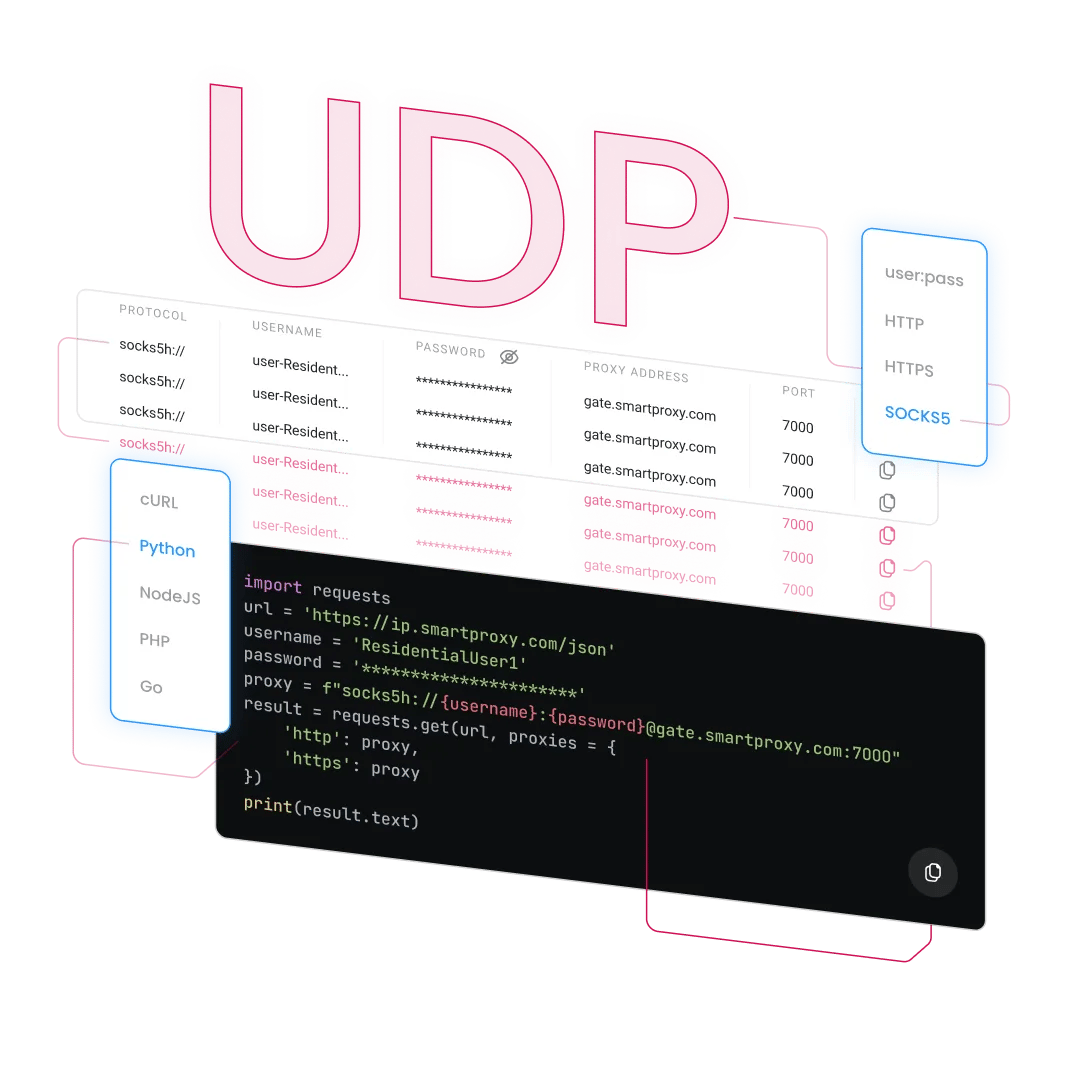Buy UDP Proxy Servers
Enhance your privacy, bypass geo-restrictions, and complete your web scraping tasks without facing CAPTCHAs or IP bans.
14-day money-back option
Discover UDP proxy locations worldwide
Explore a wide range of UDP proxy server locations around the globe and enhance your network performance while accessing region-specific data.
Leverage UDP protocol with global proxy coverage, and enjoy faster connections, reduced latency, and unmatched reliability while completing all sorts of tasks.
Flexible pricing for any demand
Leverage cutting-edge UDP proxies and complete your web scraping projects without a single restriction.
14-day money-back
SSL Secure Payment
Your information is protected by 256-bit SSL
Explore UDP proxies use cases
Whether for multi-accounting, collecting real-time data, or completing SEO tasks, UDP proxies with global reach can provide the speed, flexibility, and privacy you need.

Browsing
Surf the internet anonymously, bypass blocks, and complete your tasks online faster.
Price tracking
Monitor and analyze pricing trends to maintain a competitive edge in dynamic markets.
Multi-accounting
Create and manage multiple social media or eCommerce profiles with ease.
AdTech
Detect and remove bot traffic from your paid advertising campaigns to optimize budget allocation.
SEO
Perform website audits, monitor localized content performance, and track search engine ranking fluctuations in global SERP.
AI training
Collect datasets to develop and refine AI models, including LLMs, SLMs, GPTs, and AI-powered agents.
Easily implement UDP proxies
Seamlessly integrate our UDP proxies with the most popular programming languages, and build or scale your web data projects fast.
Enjoy UDP proxy features
Enhance your performance with UDP proxies – overcome geo-restrictions, CAPTCHAs, and IP bans with a reliable solution every Decodo user loves.

99.99% uptime
Complete your projects seamlessly with premium UDP proxies that guarantee stable connection for each and every project you’re working on.

Zero restrictions
Access almost any target online and leave CAPTCHAs, IP blocks, or geo-restrictions behind – you’ve got the key.
Advanced targeting
Leverage our next-generation targeting with UDP proxies – choose from 195+ locations, including city, state, and country targeting.

Adaptive protocol flow
Experience dynamic traffic routing with our proxies that automatically suit your UDP use case, ensuring optimized performance.

Easy integration
Add our UDP proxies to your toolstack without a single hassle – follow our quick start guides or watch video tutorials and get started in minutes.
Unlimited threads & connections
Manage multiple tasks simultaneously without facing performance disruptions, thanks to our robust proxy infrastructure.
What others are saying?
We're thrilled to have the support of our 130K+ clients and the industry's best
Easy to get things done
Decodo provides great service with a simple setup and friendly support team.
R
RoiDynamic
A key to our work
Decodo enables us to develop and test applications in varied environments while supporting precise data collection for research and audience profiling.
C
Cybereg
Best Usability 2025
Awarded for the ease of use and fastest time to value for proxy and scraping solutions.
Featured in:
Frequently asked questions
What is a UDP proxy?
A UDP proxy is an intermediary that handles User Datagram Protocol traffic by relaying data packets between clients and servers without establishing a connection. It’s ideal for real-time use cases, like multi-accounting, SEO monitoring, and ad verification. Unlike TCP proxies, it skips error-checking to reduce latency.
How reliable is a UDP proxy server?
UDP proxy servers prioritize speed over reliability, so data can get lost or arrive out of order. They’re best for low-latency tasks where minor data loss is tolerable. However, our proxies automatically optimize traffic routing for your specific use case, so you can rest assured your performance remains uncompromised.
Why use UDP instead of IP?
UDP operates at the transport layer (on top of IP) to manage application-specific data flow. It’s used when you need a fast, lightweight connection working with DNS queries. IP addresses alone don’t handle port-based routing or application-level optimizations.
What is the difference between a TCP and a UDP proxy?
TCP proxies establish verified connections and ensure error-free delivery, making them reliable for file transfers and web scrapers. UDP proxies skip so-called handshakes and error checks and focus on speed for real-time services. TCP suits stable data transfers, while UDP excels in low-latency scenarios.
Which is better, TCP or UDP?
Neither is universally better – it depends on your use case. TCP ensures data integrity when running web scraping tasks or price-tracking tools, while UDP minimizes delays in real-time tasks, like SEO keyword research. In short – choose TCP for reliability and UDP for speed-sensitive tasks.
What is UDP best used for?
UDP shines in real-time applications where delays cause more harm than minor data loss, such as price monitoring, SEO research, or ad verification. More advanced use cases include DNS lookups and connecting IoT sensors.
Buy a UDP Proxy Server
Get a UDP proxy server to enhance data transmission and reduce latency worldwide.
14-day money-back option
